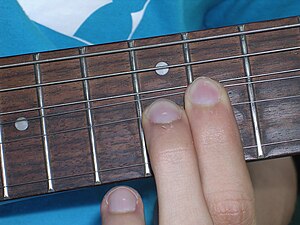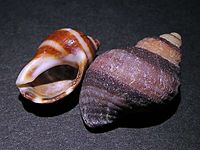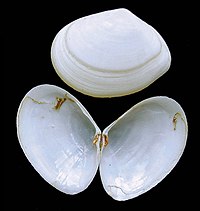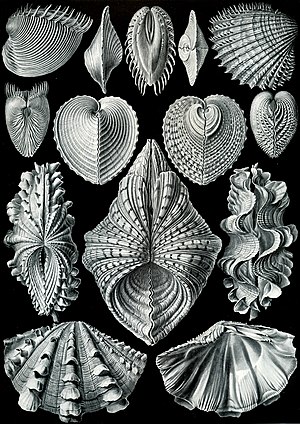Especialidades JA/Moluscos/Respuestas
| Moluscos | ||
|---|---|---|
| Asociación General
|
Destreza: 2 Año de introducción: 1938 |
|
Requisitos
1
2
2a
2b
2c
2d
2e
2f
2g
2h
2i
3
4
5
6
7
Shells have been used by man in the following ways:
- Money
- Shells have been used in many cultures as a form of money.
- Buttons
- Buttons were originally cut from shells. Plastic buttons we use today still resembled the pearly surface of the inside of a seashell.
- Adornment
- Many cultures made (and make) jewelry from shells. Holes can be drilled into shells to make beads. Shells are also inlaid into wood in an artform called intarsia (also in marquetry and parquetry).
- Hair combs
- Shells have been cut to shape and used to comb hair.
- Fret board markers
- The markers (often round dots) between the frets on the fingerboard of a guitar (or other stringed instrument) are made of shell.
- Utensils
- Shells were used to make spoons, knives, cups, and dishes by primitive cultures.
- Chemistry
- Shells are made from calcium carbonate, a chemical useful in the laboratory. Calcium carbonate is widely used medicinally as an inexpensive dietary calcium supplement or antacid. It is also used in the pharmaceutical industry as a base material for tablets of other pharmaceuticals.
- Lime
- Seashells can be crushed to make lime which is used to raise the pH level in soil.
8
A bivalve is a mollusk with a two-part shell, such as an oyster, clam, scallop, or mussel. A univalve is a mollusk with a one-part shell, such as a snail, conch, or whelk.
9
Bivalves
Bivalves typically have two-part shells, with both valves being symmetrical along the hinge line. The class has 30,000 species, including scallops, clams, oysters and mussels.
10
You can collect shells on beaches or buy them at craft stores. If buying them, it is cheaper to buy a variety pack rather than getting them individually. Once you have 20 different types of shells, you can begin the process of identifying them. For this you will need a field guide such as one of these:
11
Source of Pearls
A pearl is a hard, rounded object produced within the soft tissue (specifically the mantle) of a living shelled mollusk. The finest quality pearls have been highly valued as gemstones and objects of beauty for many centuries, and the word pearl has become a metaphor for something rare, fine, and admirable.
Comentarios de Elena de White
El libro de Elena de White, Palabras de vida del gran Maeastro, se puede leer por internet. Las páginas requeridas aquí se puede encontrar en el capítulo 9.
12
| Levítico 11:9 y 10 | a. ¿En qué día fueron creadas las criaturas acuáticas? |
| Hechos 16:14 | b. El número de criaturas acuáticas es innumerable. |
| Isaías 50:2 | c. Criaturas acuáticas perecen fuera del agua. |
| Apocalipsis 21:21 | d. Job consideró el coral de gran valor. |
| 1 Timoteo 2:9 | e. Salomón estaba familiarizado con la vida marina. |
| Génesis 1:20 y 21 | f. Jesús utiliza 2 veces una concha para enseñar una lección espiritual. |
| 1 Reyes 4:33 | g. Una empresaria se dedicaba a la venta de los famosos tintes de púrpura garantizados, tomado de los mariscos del Mediterráneo llamado Murex. |
| Salmo 104:25 | h. Pablo no apoya el uso de perlas. |
| Mateo 7:6; 13:45 y 46 | i. Los moluscos son impropios para la alimentación. |
| Job 28:18 | j. Las 12 puertas de la Santa Ciudad son 12 perlas. |
Referencias
- Categoría: Tiene imagen de insignia
- Categoría:Libro de Respuestas de Especialidades JA/Especialidades
- Categoría:Libro de Respuestas de Especialidades JA
- Categoría:Libro de Respuestas de Especialidades JA/Nivel de Destreza 2
- Categoría: Libro de respuestas de especialidades JA/Especialidades introducidas en 1938
- Categoría:Libro de Respuestas de Especialidades JA/Asociación General
- Adventist Youth Honors Answer Book/Nature/es
- Adventist Youth Honors Answer Book/Nature/Primary/es
- Categoría:Libro de Respuestas de Especialidades JA/Etapa 0





